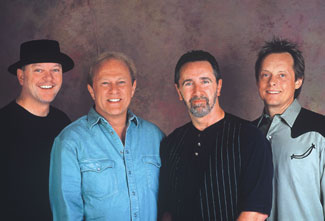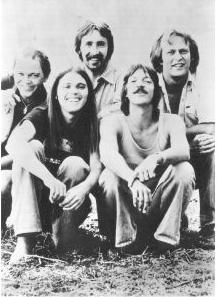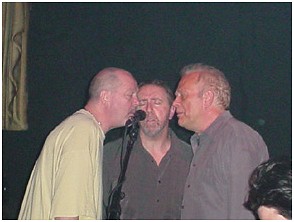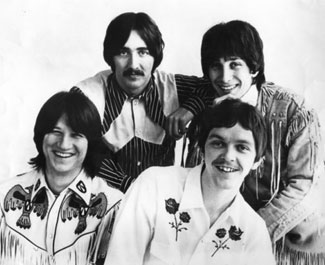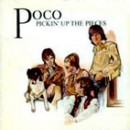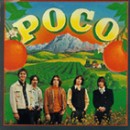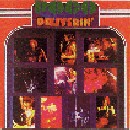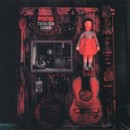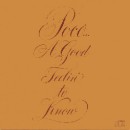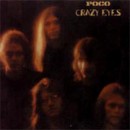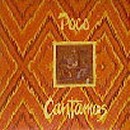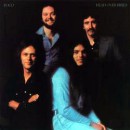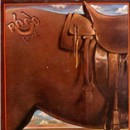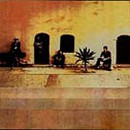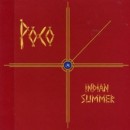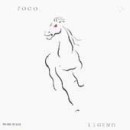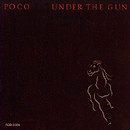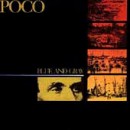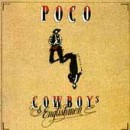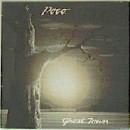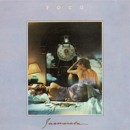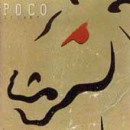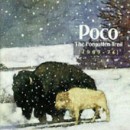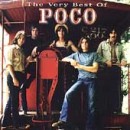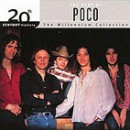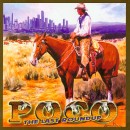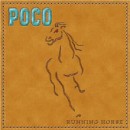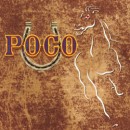|
Jack has recently re-joined Poco. He moved to Nashville in 1981 and toured as a bassist with a number of country acts: Vince Gill, Dickey Betts (along with the Greg Allman Band), the O'kanes, Gail Davies, Kathy Mattea, Michael Johnson, Nicolette Larsen, Gary morris, Bobby Whitlock, Bailey and the boys, and many more. He has played with Poco three times. He was also the lead singer/writer for the band Great Plains. A single from their debut album, "faster gun" went to number 28 on the US charts. see Great Plains Info. As well as playing in Poco in 1986 and 1990, Jack has been full time now with Poco since 2000.
Poco,
one of the first and longest-lasting country-rock groups, had its roots in the dying embers of the Buffalo Springfield: After co-founders Neil Young and Stephen Stills exited in the spring of 1968, only guitarist/singer Richie Furay and bassist Jim Messina remained to complete the group's swan song, Last Time Around. The final Springfield track, "Kind Woman," included only Furay and Messina, with a guest appearance on steel guitar by Rusty Young, formerly of Boenzee Cryque.
He stuck with Furay and Messina, passing on a scheduled audition for a new group that Gram Parsons was putting together; auditions followed before the fledgling group reached out to Young's ex-Boenzee Cryque bandmate George Grantham on drums and vocals and to bassist/singer Randy Meisner. This lineup rehearsed for four months before making their debut at the L.A. Troubadour in November. A month later, they made their first appearance at the Fillmore West on a bill with the Steve Miller Band and Sly & the Family Stone.
At the time, they were using the name Pogo, but that didn't last; Walt Kelly, the creator of the comic strip Pogo, from which they'd freely admitted borrowing the name, didn't appreciate the group's choice and filed a lawsuit. Not wanting to lose all of the recognition and goodwill they'd built up locally over the previous five months, the result was a change of just one consonant, to Poco.
Just one day after signing to Epic in early 1969, Meisner suddenly left the band, apparently over personality clashes; he later joined the Eagles. Recorded as a four-piece, Poco's debut, Pickin' Up the Pieces, was released in June of 1969. The group was back to being a quintet in 1970 with the addition of bassist Timothy B. Schmit, whose arrival coincided with the recording of their second album, Poco. It wasn't long after that Messina decided to leave, feeling that Furay had assumed too much control over the group's sound. Before departing, he secured the services of a capable replacement member -- Paul Cotton, a onetime member of the Illinois Speed Press -- and also played on and produced their subsequent album, Deliverin', which rose to number 26 and yielded the minor hit "C'mon."
Their next album, 1971's From the Inside, was produced in Memphis by Booker T. & the M.G.'s guitarist Steve Cropper.The same lineup became the first Poco membership to last for more than one studio album; their second, A Good Feelin' to Know, was released in 1972, but by this time, even Furay had begun to lose heart over the band's lack of commercial success. The band made one renewed effort, Crazy Eyes, their most accomplished studio album to date; released late in 1973, it became their most successful work. However, just as the LP was released, Furay left the group to hook up with Chris Hillman and John David Souther to form the Souther-Hillman-Furay Band.
Still, Poco continued as a quartet; their next album, Seven, released in the spring of 1974, failed to replicate the success of Crazy Eyes. The group was at a critical point in their history following the release of one more Epic album, Cantamos, which appeared in the fall of 1974 and got no higher than number 76. After parting with Epic, Poco signed with ABC Records in 1975; their first album, Head Over Heels, issued in mid-1975, surpassed expectations to fall just shy of the Top 40.
After the album Rose of Cimarron, the group came close to splitting up in 1976, with new member Al Garth exiting in the middle of the year. Finally, in the spring of 1977, Indian Summer was released; four months later, Timothy Schmit exited the lineup to replace Meisner in the Eagles. Grantham followed him out of the band in January of 1978, eventually becoming Ricky Skaggs' drummer.
The group re-formed with Charlie Harrison and Steve Chapman joining Young and Cotton; Kim Bullard, a Crosby, Stills & Nash alumnus, came in on keyboards in December of that year, and Poco was once again a quintet. All of these personnel changes seemed to have done the trick, because their next album, Legend, released late in 1978, became the best-selling LP in their history, earning a gold record in the course of rising to number 14. The accompanying single, "Crazy Love," reached number 17, far and away their biggest seller to date. It was matched by Cotton's "Heart of the Night," which got to number 20 during the summer of 1979.
Furay rejoined the group briefly in mid-1984 along with Schmit, resulting in the Inamorata album. A five-year hiatus followed before the original quintet re-formed in the spring of 1989. Their comeback single, "Call It Love," hit the Top 20, accompanied by the album Legacy, which made it to number 40. Although the 1968 lineup didn't stay together, Poco was restored as a working band, touring periodically with Cotton and Young at its core. In 2002, the band released a new album, Running Horse, through their website,
PocoNut.com
Poco is a country/rock band. If you turn on commercial country radio and listen to the sound coming out of Nashville today, the current crop of country stars is doing what Poco started doing in 1968 in Southern California, except Poco did it with more grit and less calculation.
"It's kind of funny," Rusty Young says without really laughing. "When I came to Nashville in 1985 the record mogul was Jimmy Bowen. We sat down with him and we had just come off a record where Paul (Cotton) and I had hit singles. Jimmy Bowen started telling us what we couldn't have on a record certain guitar sounds, a certain drum sound, two lead vocalists. Five years later in Nashville they were making the records they said we couldn't make. I'm glad Jimmy Bowen has retired and moved to Hawaii."
But Poco is still at it. Formed from the ashes of Buffalo Springfield veterans Rusty Young, drummer George Grantham, and singer/bassist Randy Meisner worked legendary West Coast nightspots such as the Troubadour and Fillmore West. The group's trademark sound mixed twang and backbeat with harmony vocals. Meisner left early on and eventually joined the Eagles. Timothy B. Schmit stepped in. Schmit later left to replace Meisner in the Eagles.
There have been several members in and out since, but the group still includes Young, Cotton and Grantham plus bassist Jack Sundrud. "It takes a combination of a lot of things to keep a band together," Young said. "I've known George Grantham since we were 16 and in kid bands in Colorado. Paul Cotton joined in 1970 so we've been bandmates and best friends for 30 years. I'm a fan of his. The reason bands go through members is people grow as artists. If bands don't change, that means they're not growing as artists.
"I've always thought of Poco as a tree that had to be pruned. When Jim Messina and Richie Furay left it gave the rest of us room to grow. When those guys were in the band we never had a hit record. When they left we went platinum. It gave us room to grow and they certainly had success."
Poco now works between 50 and 60 dates a year, mainly on package shows. The band has a new album (Running Horse), which will be number 20-something. There's plenty of interest in Poco. Case in point, during each of the last three years there's been some sort of greatest hits or compilation album released.
As a player, Young has recorded with a variety of artists including Bill Lloyd and Restless Heart.
"I'm not doing sessions as a session player. I don't enjoy that," he said. "But I'll play with my friends. I play with Bill Lloyd. That I like. I probably should practice, but I don't. I started when I was 6. I'm what, 21 now? (There was another laugh.) What I do is so defined by my history. I do get a lot of practice on guitar when I'm writing songs."
Young has experienced success as a writer. Emmylou Harris, Bryan White and others have covered his tunes. "I write all the time but I'm a slow writer," he added. "Some people write a song a day. I write maybe a song a month. I'm so picky. I go over and over and over a song." "We play songs people are familiar with," he said. "We mix the hits with songs that showcase great playing and great singing. Songs stay fresh because of the audience. When you see people singing along, that makes everything worthwhile."
|

